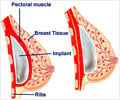Smart implants that deliver a drug to just the right place in the body into biobatteries that release the medicine exactly at the right rate has been developed by Australian scientists.
An Australian team of scientists has come up with a way to turn smart implants that deliver a drug to just the right place in the body into biobatteries that release the medicine at exactly the right rate.
Gordon Wallace of the University of Wollongong in New South Wales highlights the fact that presently it is very difficult to control how quickly implants release their payload.The researcher says that the biobattery produces a current of a known strength that controls the drug’s release.
A research article on his approach reveals that the smart implant is based on magnesium alloy stents that are being developed for surgeons to use as temporary splints to keep damaged blood vessels in shape while they heal.
The article adds that Magnesium is used because it can corrode away inside the body safely when the stent’s job is done.
Wallace says that he and his colleagues have developed a biobattery from a magnesium alloy anode and a conducting polymer cathode, which carries an anti inflammatory drug.
During an experiment, the researchers immersed the device in an electrolyte to simulate the body fluids around a real implant.
The team also tried fine tuning the rate of drug delivery by coating the magnesium alloy with a biodegradable polymer that slowed its corrosion, reports New Scientist magazine.
According to him, the device could be used in any implant that corrodes, such as titanium hip joints, which form titanium oxide on their surface.
Source-ANI
SPH
 MEDINDIA
MEDINDIA




 Email
Email





